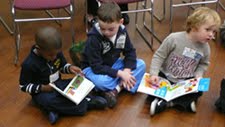"The more I am involved with the program, the better it gets. I was most impressed with the children carrying the message of the program back into the classroom and "using" it. Sure, during the It's OK sessions, there is constant reference to being kind, co-operative, sharing and accepting, but, it is a whole different "ballgame" putting the program into practice. I just love the following example and outcome:
On one occasion, the children were asked to wear red, white and blue on a certain day. When one little girl did not, I asked, "Why?" Her response was, "Mrs. Gorski, it's OK to be different, ya know." She was very secure with herself, very confident so who was I to argue. She taught me a lesson of acceptance that day. The total outcome was even better. The children picked up on it and used it on different occasions while doing class work or while speaking to other children on the playground. They remembered their friends' feelings, included other children in games and even reminded each other that secrets cause hurt feelings. They got the concept of acceptance and kindness - at least most of the time!
Ther was one incident when the program was used as a tool while talking to parents regarding their child's behavior. We, the staff, put into practice what we preach in school. Because the parents assist in the It's OK program, they were able to teach their children at home the same concepts. It is not a once a week lesson to be used only then. It is a lesson for a lifetime!
I think it is important that the program be introduced at an early age and used yearly as the children develop so does the level of presentation. The more widespread the program, the quicker the word will spread that it is OK to be different."
Sunday, August 14, 2011
Thursday, August 4, 2011
Refection from Chris Halpin, Principal
"As a principal of an elementary school, I can't think of a more valuable program. It is obvious that the development of empathy should be at the heart of any character education. The dramatic call for anti-bullying programs by politicians, parents, students and educators is sufficient evidence. The essence of It's OK to be Different is the development of empathy by targeting stereotyping, prejudice and discrimination. I know of no other program that does this so well.
Besides involving various segments of the community in implementation, the program avoids the usual charge of 'just one more thing' in the overloaded curriculum. Because of the involvement of all the language arts components - reading, writing, listening, speaking and viewing - the teacher can readily use the program to supplement instruction.
However, the most important contribution of the program to the elementary school is the establishment of a common language of empathy. As a principal, I was able to use the concepts of It's OK to resolve conflicts, establish an atmosphere of acceptance and understanding and create programs of community involvement.
We had a wonderful school, renowned throughout the area, and, I believe, it was because of this program."
Besides involving various segments of the community in implementation, the program avoids the usual charge of 'just one more thing' in the overloaded curriculum. Because of the involvement of all the language arts components - reading, writing, listening, speaking and viewing - the teacher can readily use the program to supplement instruction.
However, the most important contribution of the program to the elementary school is the establishment of a common language of empathy. As a principal, I was able to use the concepts of It's OK to resolve conflicts, establish an atmosphere of acceptance and understanding and create programs of community involvement.
We had a wonderful school, renowned throughout the area, and, I believe, it was because of this program."
Subscribe to:
Posts (Atom)


